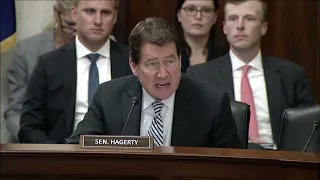WASHINGTON— United States Senator Bill Hagerty (R-TN), a member of the Senate Rules Committee, today delivered opening remarks at a hearing on the DISCLOSE Act, which would place additional constraints on Americans’ First Amendment rights.

Remarks as prepared for delivery:
Thank you, Chairwoman Klobuchar.
And thank you to all of the witnesses for joining us today.
I think we all share the goals of ensuring that our elections are transparent and fair. But these goals aren’t served by limiting Americans’ First Amendment rights, which is what the DISCLOSE Act would do.
First, this bill would require virtually any entity that engages in political speech, including non-profits, to publicly disclose the names and addresses of its significant contributors. This is a thinly veiled attempt to send the message that, if you support an organization that happens to support causes with which some disagree, you become a target for criticism, harassment, and intimidation—even if your support has nothing to do with the organization’s position on a certain issue. It would fuel new frontiers of cancel culture and personalization of politics.
This tactic is not new. In 1957, in unanimously striking down an attempt to compel the NAACP to disclose its members, the Supreme Court stated that government-compelled disclosure of group affiliation violates the First Amendment. The Court recognized the “vital relationship between freedom to associate and privacy in one’s associations.”
Just last year, the Supreme Court reaffirmed this principle by holding that California’s attempt to compel non-profits to disclose donor names and addresses was unconstitutional. Noting that advocacy groups from the ACLU to Americans for Prosperity opposed California’s compelled-disclosure requirement, the Court found that it chilled speech and created a real risk of threats, violence, and harassment.
In recent weeks, we’ve seen how personal information can be weaponized, with groups organizing protests at the homes of Supreme Court justices, and even their children’s schools. One group is even offering bounties to anyone who sights a Justice and reports it, so that protestors can swarm that location.
For those who choose to engage in political advocacy, the DISCLOSE Act would open the floodgates to this sort of dangerous behavior.
It would require a choice between silence and harassment, and as a result, many would choose not to speak.
The First Amendment is expressly intended to prevent this sort of silencing.
The bill also creates new, unworkable, and subjective constraints on speech.
It would subject virtually any communication—by virtually any entity—that even mentions a candidate or public official, to FEC regulations and donor-disclosure requirements.
This legislation would also require speakers to declare whether communications that simply mention a federal official are made in support or opposition to the official, even if the communication is not made in support or opposition to that official. This would force inaccurate and unconstitutional declarations of allegiance.
The bill also includes oppressive new disclosure requirements in order to communicate. These include requiring non-profit entities and other groups to name in each political communication their top donors and how much money each donated to the organization. And unbelievably, it requires showing a full-screen image of the person who leads the entity that is making the communication.
All of this would infringe upon and discourage free speech. As a 2021 op-ed from two ACLU lawyers put it, “We know from history that people engaged in politically charged issues become political targets and are often subject to threats of harassment or even violence.”
The First Amendment is based on the principle that the remedy for speech with which you disagree is more speech, not forced silence. Our Constitution creates a free market of ideas—if you disagree with someone’s views, the remedy is to express your own views, not to silence theirs.
Because the DISCLOSE Act promotes intimidation, rather than free speech, I cannot support this legislation.
I look forward to hearing the testimony from the witnesses joining us today.
Thank you, Chairwoman Klobuchar.
###